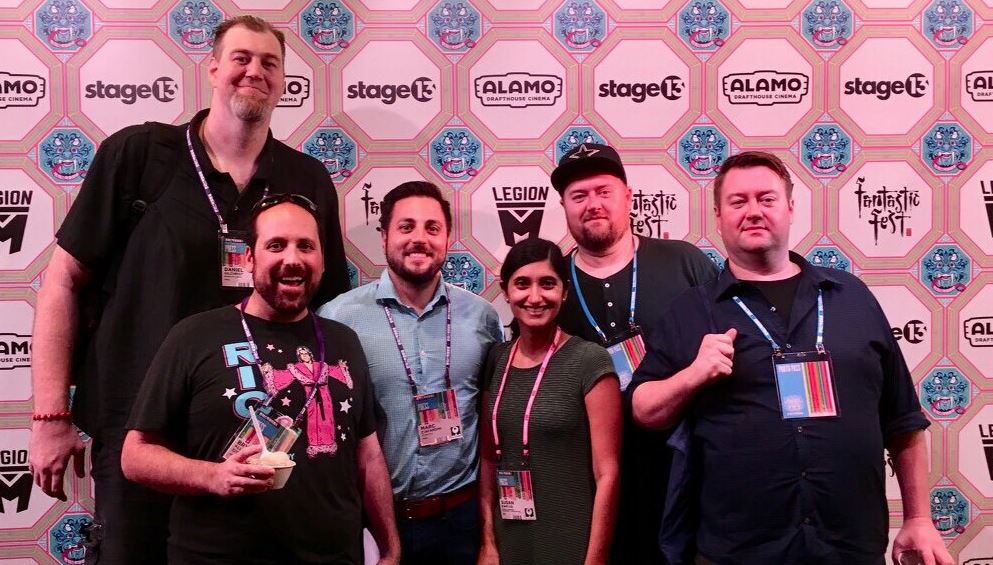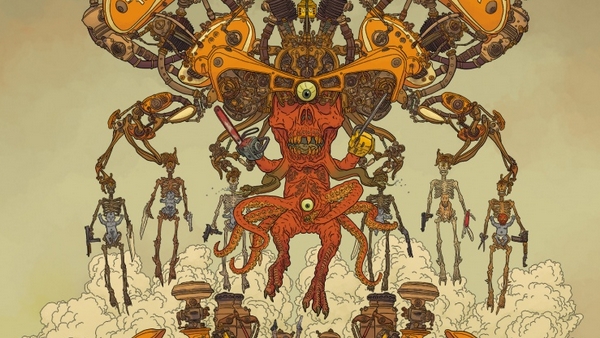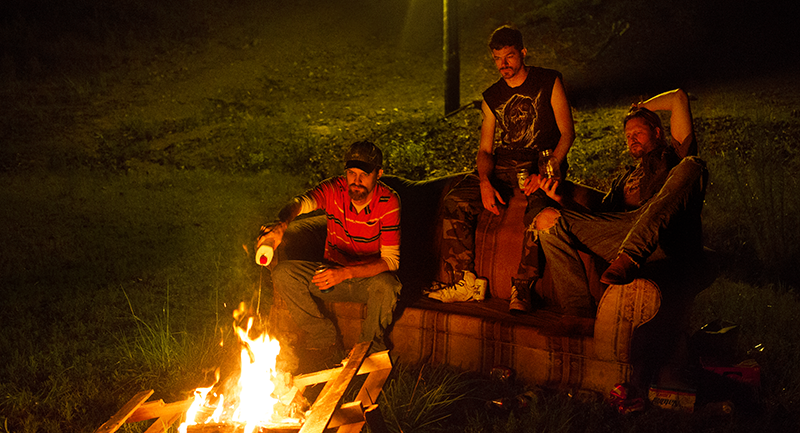
As far as actors go, Michael Abbott Jr. is as down to earth as they come. He’s a family man, a fine actor, and the kind of person you’d just enjoy having a beer with. He stars in Daniel Scheinert’s sophomore film, which, after Swiss Army Man, this is the only logical step for the director.
Title notwithstanding, A24’s The Death of Dick Long is a strange film. It’s a crock pot full of themes and characters taking a swing at multiple genres – drama, noir, comedy – and knocking every pitch right out of the park.
We spoke to Michael over the phone where he let on that the success of Scheinert’s film came from the casting of unknowns. That’s not to say that the likes of Andre Hyland, Virginia Newcomb and Michael himself are fresh faces to the screen – far from it. But they let you focus on how they develop their characters instead of seeing the likes of Daniel Craig in Steven Soderbergh’s similarly Southern-fried feature.
In our nearly hour-long interview, Abbott shared stories from the set, experiences on working with child actors, the sobering fact you can’t make a living doing Shakespeare, and how his friend, director Jeff Nichols, got him into acting in film.
If you haven’t seen The Death of Dick Long, do it…like now. Don’t even watch the trailer. For all the rest of you, enjoy!
I saw The Death of Dick Long at Fantastic Fest, and I had a chance to talk with Daniel, Andre and Virginia. I have to credit each of you with how you created a persona that is so far from who you are personally. Talk to me about the idea of getting into character and how you prepared yourself.
I was one of the last people brought on board, so I didn’t have a whole lot of prep time. Daniel Scheinert was eyeing some larger names, and there was some interest from some well-known actors.
What was decided between Daniel, Billy Chew (the writer), and A24 was that they either had to cast the film with all unknowns, or it just wouldn’t work. A film like this, if you go in with a preconceived notion of who somebody is, it can affect the film in a negative way because you don’t allow people to get lost in who they’re playing.
I had a little bit of an advantage because I grew up in East Tennessee, and I knew a lot of these guys…well I didn’t know anyone who had the skeletons that my character had in his closet, [Laughs] but I was very familiar with the kinds of men who aren’t comfortable carrying their hearts on their sleeve. It’s just not as accepted to show emotions.
I happen to be the opposite of that, probably because of my 20 years in New York City. I’m very comfortable telling someone how I feel, so I had an advantage. But it was also a disadvantage because there were moments during shooting where I felt like there were opportunities there for the character to emote, and that wasn’t appropriate for this guy because it’s not part of the community he was part of.
It’s not acceptable to break down in tears as his daughter drives away. My hope is that the audience sees those wheels turning, and they understand what lies underneath, but the challenge of where he is doesn’t allow it to surface.
This movie is a Trojan horse for all these sub-level plot devices and themes. It seems like a knuckle-head noir, but it’s a tornado of relationships, emotions, personal secrets, the put-upon expectations of a nuclear family and more. Even the tightrope walk of uproarious humor and tense drama was so unexpected.
I think another actor challenge in a film like this was for someone like Andre who has an improvisational and comedic background – the moment that we as actors try to make a line funny, or find the humor in the situation, we are dead in the water.
It really comes down to giving over to the circumstances the characters were in and truly believing it. The truth is where I feel the comedy was able to truly shine.
If you play something funny, with actions or even music, it’s just a different kind of humor. You start to get into Mel Brooks territory. That’s not a bad thing, it’s just a different product.
Exactly! And that’s not the road we wanted to take.
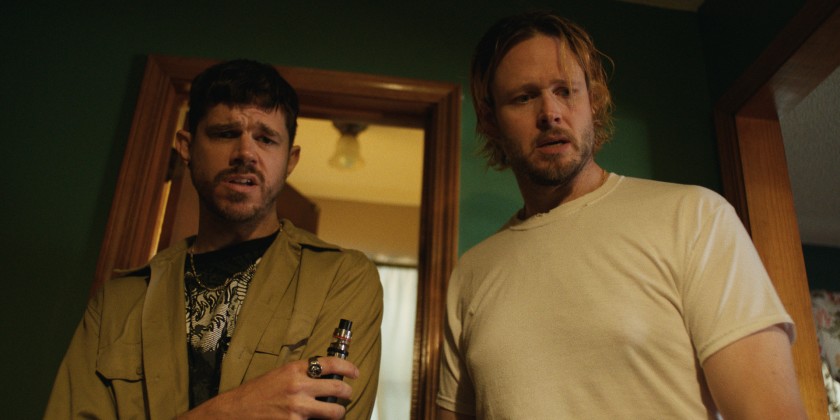
I read that you and Andre lived together for more than a month. What’s the back story, and how did that help with your performances?
We had spoken to each other on the phone, and the producers gave us the option to either live by ourselves and have our own private space, or we could live together. We’re both private people, but he and I quickly agreed that we needed to do this. We felt that the bond needed to be super strong in order to sell the story and the camaraderie.
These guys aren’t just best friends, they’re seeing each other at their absolute lowest points, fairly regularly, and they still accept each other for that.
Living together heightened the circumstances as we discovered organic ways to play off each other. There are a fair amount of small moments in the film that weren’t in the script, like where we push the car into the water, and it doesn’t go all the way in, and we get into a fight.
I threw a punch and I actually made contact with Andre’s face. He really chipped a tooth. I think everyone was very aware what had happened, and Ashley, the cinematographer, and Daniel had enough sense to keep rolling.
I think that’s one of my favorite moments because we went from being angry and fighting to this beautiful moment of concern. I thought I was going to get fired, and would I have to pay for his tooth out of my own insurance. All these thoughts were going through my mind. Had we not had the rapport from living together, that scene could have been something different and not amounted too much.
What was it like off screen?
We did a lot of exploring. We lived in a six-bedroom mansion in a neighborhood that was completely abandoned. All the other houses we either boarded up or burned down…apparently we were not in a good part of town which made us rely on each other even more.
One of us would be home worried sick that the other wasn’t going to make it home. “Where have you been? Why didn’t you call me?” It really became a husband and wife relationship. [Laughs] I think the world of Andre, and as far as comedy goes, I had never worked with someone I was just in awe of who had the ability to think on his feet and improvise.
Did you style your hair like Chad Kroeger, or like Brad Pitt’s character in World War Z?
[Laughs] I certainly pushed for Chad’s Nickelback hair. Daniel and Billy were not totally sold until I got to town and had a face-to-face. I just felt that if this guy was going to bars, and playing Nickelback covers, he would go the whole way.
I also put on a little bit of weight because I thought it was appropriate for the role, but I felt like he felt that he looked exactly like Chad. He thought he had the same body type, the same voice, the same guitar talent. I knew regardless of the blonde hair or not, the look had to be striking and stand out from everyone else because I felt like he walked around town feeling like a rock star.
Once I got to Alabama, and got the hairdo and spent time around town, I certainly got a lot of looks from locals. I noticed that I started wearing hats a lot of the time while off set. Andre got lucky – he got the Caesar cut which everyone has in Alabama. He didn’t feel too out of place.
Rachel, who did costumes, she knew what everybody would wear from the get-go because when she read the script, she realized she had dated every character from the film. [Laughs] She dressed everyone exactly how I had pictured them in my head.
I never ever felt like I was on a set, because the costumes, the art direction, and the scenic design were all so good. Nine times out of ten, that doesn’t happen on a film. They really went above and beyond to build these houses out completely. Every location in which we shot was a completely empty house. Everything was specifically chosen for the film and brought in. We shot in Alabama and the town became a character itself.
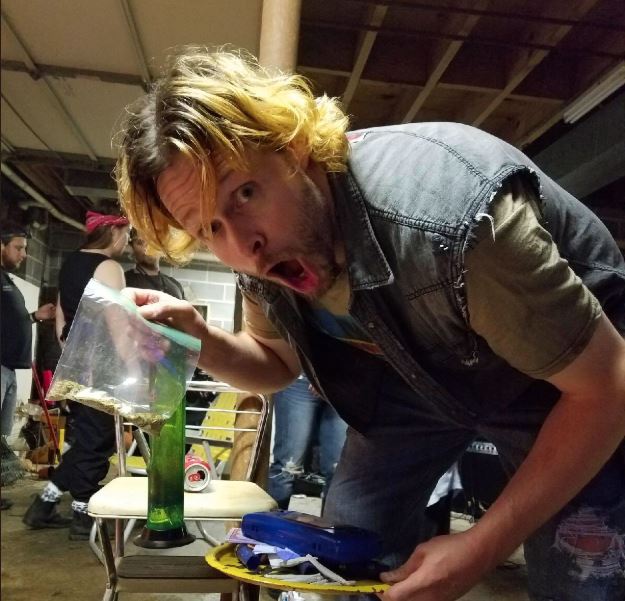
Really? Everything was curated?
Yeah. Crazy, right? The crews had nothing but a blank shell, and they really built it from the ground up. That’s everything from the house to Earl’s trailer, even Earl’s truck. That belonged to the art department head, Ali. She painted the grill of her own truck lime green. If that’s not fucking commitment, then I don’t know what is. [Laughs] And she drove back to Los Angeles with all that crap still on it!
Did you keep anything from the film? Anything you had your eye on the whole shoot?
I kept the guitar that I semi-learned to play, horribly, which is a kid-size electric Kawasaki guitar overlaid with a camouflage decal. I also kept the amp, and I kept one of the pieces of paper where I wrote ‘Dick Is Dead’. Andre got that framed for me. I think I kept one t-shirt that was Guns ‘N Roses but the costume girl turned it into Nuns ‘N Hoses. It’s pretty funny.
Going from a kid guitar to working with kids, let’s talk about Poppy Cunningham. What’s the vibe on set when with a child who unknowingly advertises wrongdoings by sitting in incidental blood?
[Laughs] Honestly, working with Daniel, even when there weren’t children on set, he runs things as if we’re all children. We’re obviously dealing with pretty dramatic subject matter, and I think the genius in how Daniel works is that he likes to keep things very light between takes.
He had a radio on set. We would cut from a take, the music would come on, and we would have a 10-minute dance party. That’s Daniel’s way of keeping the actors out of their heads so we don’t get lost in the darkness of what we’re dealing with. But in terms of Poppy, she never knew what the film was about.
There was such an innocence to her about not knowing what we were doing. The set was run like a pretend game we were all playing. She was so sweet and innocent which perfectly matched what was needed for her character. Her delivery was organic because she’d never acted.
You can go to drama school for years, and pay thousands of dollars for them to try and teach you the same thing: try to see things like a child and take the character on with that kind of innocence. She wasn’t playing a part, she was there as herself.
Children are the most honest audience you’ll ever have. One of the first jobs I had out of college was doing children’s theater. If they don’t believe what you’re saying, they will tell you and make you look like the smallest piece of shit. They are not going to mince words. There were certain times when Poppy didn’t buy what I was doing, and that was from a child’s perspective, not an actor. And that was helpful for me.
You’ve worked with Jeff Nichols a lot, going back to his first film, Shotgun Stories. How has that relationship developed?
Yes, I was in Shotgun Stories, then Mud, and then Loving. Jeff and I were in school together at North Carolina School for the Arts – I was in the drama program and he was in film school.
We became quick friends and have remained close since then. Jeff was whole-heartedly the reason I got into film back in 2007. When I moved to New York in 2000, I was trained as a theater actor and I always thought I would make my living doing Shakespeare and theater all over the world…and the reality is you can’t make a living doing that!
So when Jeff wrote Shotgun Stories, he wrote the role of Cleaman Hayes for me. I knew nothing about the process of shooting a film, and he really took my hand and walked me through it. He stuck with me and saw something in me that I didn’t see myself at the time. I owe him a lot.
He’s not only one of my best friends, I also think he’s one of the top 5 directors working in American film today. Some of the works he’s done hasn’t gained as much mainstream attention or success, but I think people are going to look back on his films years from now and think, “holy shit, this guy had a lot to say!” And he has so many things in the pipeline that I think are going to blow people away.
When he and his wife had a child, Jeff softened in a big way. I think Take Shelter was the first script he wrote after his son was born, and I think that if you re-watch that film knowing that, I think you’ll see all the insecurities and worries that Jeff had as a new father; talk about a man who wears his heart on his sleeve and shows it on screen.
I see that carrying over to Midnight Special as well. I think that’s his best.
It’s a great film and, unfortunately, I think a lot of people wrote it off because of the last ten minutes. To me, that was one of the strongest points of the film because you have no idea it was going there…and then it did. Then Jeff just leaves you with that image. People bitched about loving the movie and hating the ending, and to me they just didn’t allow themselves to get it.
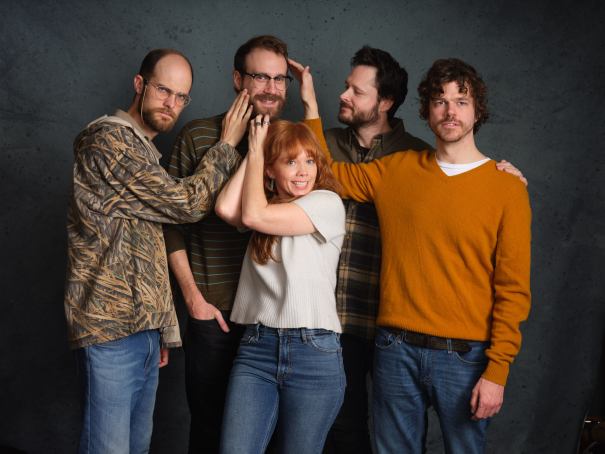
Let’s open this up and let people know more about you. The Death of Dick Long is incredibly funny, but what makes you laugh? What are your top three go-to comedies?
When I’m asked about comedy, I’m always at a loss. I don’t go for art choices, but I go for films like The Jerk. I think that’s Steve Martin’s most brilliant performance – talk about giving yourself over to a role, and not commenting on the comedy. That’s all about living within the character.
I’m a sucker for Will Ferrell. Talladega Nights: The Ballad of Ricky Bobby always makes me laugh. Same for Raising Arizona. Those are the films that make me laugh because I want to get lost in it. It’s tough not look at films as an actor, and those are the films that are so out there that you’re forced to give over to it.
Another guy Jeff and I went to school with, Shawn Harwell, was a writer on Eastbound & Down, and Red Oaks, and The Campaign starring Will Ferrell and Zach Galifianakis. He just finished a script called Booster and he’s written the lead role for me. We’re currently trying to get that made in the next year or so. I’d really like to jump into more comedy. I think it’s so much harder than drama, and I think, at this moment, that challenge excites me more than drama does.
I will happily admit liking Encino Man, EuroTrip and Goldmember. They’re no Life of Brian, Mr. Mom, or Galaxy Quest, but they really make me laugh.
Someone, I don’t remember who, told me in high school that comedy is a funny way of being serious. As simple as that sounds, it’s so true, but it is the hardest thing to teach an actor. If they can’t find the truth in the comedy, then the comedy never works. I never buy into a performance if the actor is always laughing at their own jokes. And that may be their thing but it’s so irritating because, as an audience member, how can you buy into that if you think it’s funnier than I do before you’ve even said it?
Thanks to Michael to for his time. His future projects include The Dark and the Wicked, and Hell House. We’ll keep you posted on the video release of The Death of Dick Long. Check out our review, and then see it for yourself. Scratch that, reverse it. Follow Michael on Twitter and support independent film!
